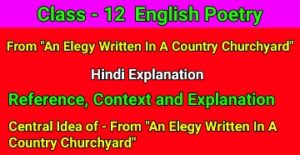From “An Elegy Written In A Country Churchyard”
From “An Elegy Written In A Country Churchyand” by Thomas Gray

The curfew tolls the knell of parting day,
The lowing herd wind slowly o’er the lea,
The plowman homeward plods his weary way,
And leaves the world to darkness and to me.
Stanza – 1 गिरजाघर की घंटी बजती है और घंटी की आवाज से स्पष्ट होता है कि दिन समाप्त हो रहा है। रंभातें हुए पशुओं का झुंड घास के मैदान से तथा थका हुआ किसान अपने मार्ग से घर की ओर धीरे-धीरे लौटते है। कब्रिस्तान मेंं अंधेरा हो रहा है और कवि अकेला है।
Beneath those rugged elms, that yew-tree’s shade
Where heaves the turf in many a mouldering heap,
Each in his narrow cell for ever laid,
The rude forefather of the hamlet sleep,
Stanza – 2 उन भद्दे Elms वृक्षों तथा सदाबहार वृक्षों की छांव में जहां बहुत सारे कब्रों के ऊपर सूखी घास उगी हुई है। इस छोटे गांव के अभागे पूर्वज प्रत्येक अपनी छोटी कब्र में सदैव के लिए लेटे हुए सो गए हैं।
The breezy call of incense-breathing morn,
The swallow twittering from the straw-built shed,
The cock’s shrill clarion, or the echoing horn
No more shall rouse them from their lowly bed.
Stanza – 3 सुबह के समय चलने वाली सुगंधित ठंडी हवा की आवाज, तिनके से बने घोसले से आबाबिल पक्षी के चचहाने की आवाज, मुर्गे की तेज आवाज अथवा शिकारी के बिगुल की आवाज । कोई भी उन्हें उनके छोटे से बिस्तर से कभी नहीं उठा पाएगा।
Let not ambition mock their useful toil,
Their homely joys, and destiny obscure;
Nor grandeur hear with a disdainful smile
The short and simple annals of the poor.
महत्वाकांक्षी व्यक्तियों को उनके उपयोगी परिश्रम का, उनके घरेलू आनंद का और उनके अंधकार युक्त भाग्य का मजाक नहीं उड़ाना चाहिए और न ही उन गरीब लोगों के छोटे और साधारण इतिहास को घृणा भरी मुस्कान के साथ शान से सुनना भी नहीं चाहिए।
The boast of heraldry, the pomp of power,
And all that beauty, all that wealth e’er gave
Awaits alike the’ inevitable hour:
The paths of glory lead but to the grave.
Stanza – 4 उच्च परिवार में जन्म लेने का अभिमान करने वाले, शक्ति का अपमान करने वाले और वे सभी जो सुंदर है और वह सभी जो धनी है। मृत्यु का समय एक समान रूप से सब की प्रतीक्षा करती हैं। वैभव के मार्ग केवल कब्र की ओर ही आगे बढ़ते हैं।
Central Idea of the poem – From ‘An Elegy Written In A Country Churchyard’
The central idea of the poem – From ‘An Elegy Written In A Country Churchyard’ composed by Thomas Gray is that – In this poem the poet expresses his deep sympathy for the poor and the simple village people. They are lie buried in their small graves in a country churchyard. The sweet morning air or the twittering of the swallows or the cock’s cry or the horns of the hunters will have no effect on the dead. The poet says that the rich and ambitious people should not laugh at the poor. Death is the end of our life. We should not be proud of our noble birth, position and wealth.
Explanation with reference ot the context of some important stanza of the poem – From ‘An Elegy Written In A Country Churchyard’
Let not ambition …………… poor.
Reference – This stanza has been taken from the poem – From ‘An Elegy Written In A Country Churchyard’ composed by Thomas Gray.
Context – In these lines the poet expresses his deep sympathy for the poor people who are lie buried in small graves.
Explanation – The poet says that the ambitious people should not make fun of the simple and useful work of the poor people. Their joys were simple. Their fate never smiled upon them. Further the poet says that the great and powerful men should not hate the poor people. The history of the poor people are very simple and short. Poverty always came in their way of progress.
The boast of ……………… grave.
Reference – This stanza has been taken from the poem – From ‘An Elegy Written In A Country Churchyard’ composed by Thomas Gray.
Context – The poet says that nothing in life is everlasting. All have to die. The end of life is same for the rich and the poor.
Explanation – The poet says that the rich should not hate the the poor. Death comes to all, sooner or later. It is seen that the people are proud of their high and noble birth. Some people are proud of their high position in society. Beautiful persons are proud of their beauty. The rich persons are proud of their wealth. Further the poet says that all these things are temporary. Death is certain. It is the end of life. Death makes no distinction between the rich and the poor. All lead to death.


